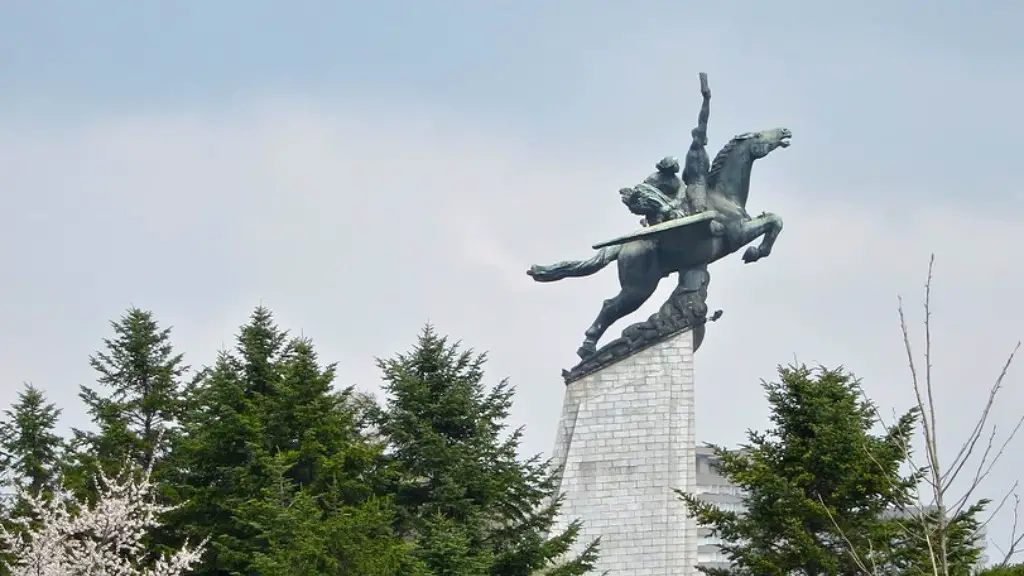Political Impact
If North Korea collapsed, the political consequences would be far reaching. The Democratic People’s Republic of Korea (DPRK) is one of the world’s most isolated nations, and its survival as a separate and distinct political entity is a major source of tension in the region. A collapse of the DPRK could have dangerous implications for regional stability and the balance of power between nations.
Most immediately, a collapse of the North Korean regime would likely result in a flood of refugees seeking to escape political violence and economic deprivation—a scenario that could cause a major humanitarian crisis in neighbouring states. South Korea, in particular, would face the greatest burden, as millions of North Koreans moved south. The political implications of the influx of refugees would be immense: South Korea would need to provide housing, food, and medical services to the displaced people while also negotiating diplomatic relations with the new government that emerges in the North.
In addition, international attention would inevitably focus on the nuclear weapons that North Korea is believed to possess. In the event of regime collapse, control of these weapons would be uncertain and could fall into the hands of a hostile or unpredictable leader. This could lead to dangerous confrontations with other nations in the region, as rival states scramble to secure their own strategic interests. As a result, the entire region would be subject to a great deal of upheaval and instability.
The collapse of the DPRK would also put the US-South Korea alliance under considerable strain. The US has long been a close ally of South Korea, and its support has been critical in helping the nation protect itself against North Korean aggression. If the North Korean regime suddenly vanishes, it would represent a substantial challenge to the alliance and lead to major geopolitical changes in the region.
Economic Impact
When considering the potential effects of North Korea’s collapse, the economic repercussions must not be overlooked. A collapse of the North Korean regime would likely cause a major economic shock to the region, as the flow of trade, investment, and labor across political boundaries would be disrupted. North Korea is a main trading partner for many of its neighboring countries, and the sudden disappearance of the regime could lead to steep losses in exports, job losses and increased import prices.
The South Korean economy would suffer particularly severe consequences, as the unification of two economies with largely distinct economic structures could prove difficult. North Korea has a much smaller and less developed economy than South Korea, and a rushed and unprepared unification process could cause more harm than good. South Korea would have to contend with the sudden influx of refugees, and the economic burden of absorbing and integrating a large population with little experience in a market economy. This could lead to a sudden collapse in economic output and an increase in unemployment levels.
The economic effects of North Korea’s collapse would also be felt around the world. International investors could be deterred from investing in neighbouring states for fear of instability and political turmoil, and some states may try to take advantage of the situation to gain strategic dominance in the region.
Social Impact
The social implications of North Korea’s collapse are difficult to predict. Depending on the circumstances of collapse, it could lead to radical changes in the region’s social landscape. The most pressing issue would be the sudden influx of refugees, which could put tremendous strain on the social services of countries in the region. This influx of migrants could cause major cultural clashes, serious security concerns, and greater competition for scarce resources.
The process of unification would also be fraught with difficulties, as North and South Korea have been divided for decades and hold deep-rooted suspicions and animosity towards each other. Many North Koreans may be reluctant to accept a unified Korea, as they have been raised to believe that South Korea is a decadent and splurging puppet of the US. There would also be a great disparity in economic opportunities between the two halves of the country, leading to major inequality and social unrest.
Finally, a collapse of the North Korean regime could have significant implications for human rights. Repressive and authoritarian rule has been a staple of life in North Korea since its founding, and if the regime suddenly disappeared, a stable form of governance would have to be established that respects the basic human rights of citizens. This could prove to be a substantial challenge and may lead to an increase in incidents of human rights violations.
Military Impact
The military impact of a North Korea collapse would be considerable, with profound implications for global security and stability. North Korea is an isolated nation and its massive army poses a threat to its neighbors and beyond. In the event of a collapse, millions of soldiers and weapons could fall into the hands of unsupervised and unaccountable actors, leading to a potential arms race in the region.
In addition, the security of South Korea—which is closely tied to US interests—would be in peril. The US maintains a strong military presence in South Korea, and a collapse of the North Korean regime could expose it to increased aggression from hostile states. This could lead to increased US involvement in the region and a heightened risk of conflict with China and other powers in the region.
Finally, North Korea’s nuclear arsenal is a major source of global concern. In the event of regime collapse, it is unclear what would happen to the weapons, as they could potentially fall into the hands of a hostile regime, be sold to terrorists, or be used to make threats and create chaos in the region. This could have far-reaching implications for global security and stability and risk conflict with other nations.
International Relations
The geopolitical implications of North Korea’s collapse would be global in nature. If the peninsula is unified, it would mean a significant shift in the balance of power in East Asia, as the traditional powerhouses in the region—China, South Korea and Japan—would be forced to share influence with a unified Korea. This could have repercussions in China’s relationship with its neighbors, as the Chinese government has long viewed North Korea as a buffer state between it and the US-led democratic order of the region.
The collapse of North Korea could also lead to a major shift in US foreign policy. As previously mentioned, the US has been an ally of South Korea for decades and has used the threat of the North to maintain its position in the region. A collapse of North Korea could mean the end of this policy and force the US to rethink its strategy in the region.
Finally, the collapse of North Korea would affect the international community as a whole. It could serve as a wake-up call to other authoritarian regimes that seek to oppress their citizens, and it could give hope to pro-democracy activists in other regions. In addition, the international community would have to grapple with the pressing humanitarian issues that would be raised by a wave of refugees fleeing the peninsula and the difficult process of stabilizing and unifying a divided nation.
Environmental Effects
The environmental effects of North Korea’s collapse would be severe. For years, the international community has been concerned about the environmental damage caused by the North Korean regime. The country has engaged in regular forest-clearing for fuel, which has led to soil erosion, desertification, and an overall decrease in biodiversity. In addition, North Korea’s factories and military installations have polluted the land and water, causing severe degradation of the environment.
The collapse of the North Korean regime would put the region’s environment at risk. If the government of North Korea were to suddenly disappear, it would be difficult to control and monitor the environment, as the newly-formed government would lack the necessary resources and expertise to enforce environmental regulations and protect the environment. This could lead to an increase in illegal logging, poaching, oil and gas exploration and other activities that would further damage the region’s fragile ecosystem.
In addition, a unification process between North and South Korea would bring about significant economic development to the region. This could lead to a significant increase in energy consumption and pollution, as well as the destruction of natural habitats to make way for factories, farms and housing. The environmental consequences of such development could cause major damage to the environment and have disastrous effects on the region’s biodiversity.
Legal Consequences
The legal ramifications of North Korea’s collapse are also difficult to predict, as the legal framework governing the region would depend on the circumstances of collapse. In the event of a collapse, North Korea’s laws would no longer be applicable and the newly formed government would have to establish a new set of laws that respect the human rights and dignity of its citizens. This could prove to be a difficult task, as North Korea has long been notorious for its human rights violations and lack of due process.
In addition, the country’s courts and legal institutions would have to be completely overhauled to ensure that justice is served in a fair and impartial manner. This overhaul would need to involve the establishment of new courts, review processes, and criminal codes. This could also raise difficult questions about how to address the crimes and human rights violations committed by the former regime.
Finally, the legality of North Korean companies and entities would be uncertain in the event of a collapse. Many of those companies are situated in foreign countries and could potentially be used to finance criminal activity or to launder money. Governments will have to take steps to ensure that such activity is blocked, and that the assets of these companies are accounted for. This could involve the seizure and freezing of assets to prevent them from falling into the wrong hands.

